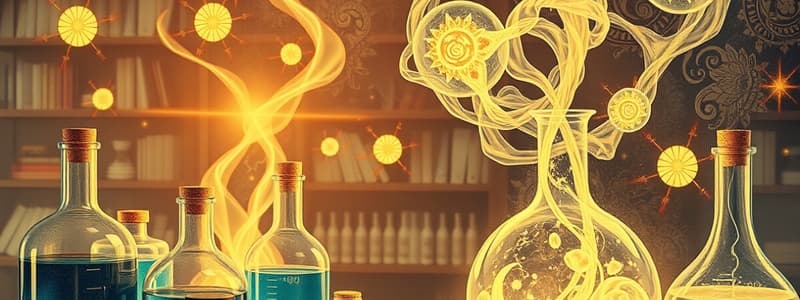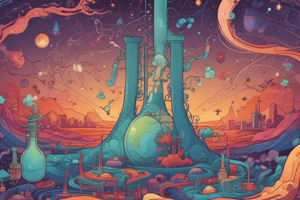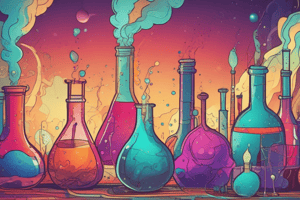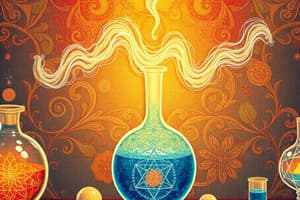Podcast
Questions and Answers
All things are made of _______
All things are made of _______
chemicals
Chemical reactions happen when the _________ hook together.
Chemical reactions happen when the _________ hook together.
electrons
Energy is given off when electrons __________ with other electrons.
Energy is given off when electrons __________ with other electrons.
combine
When water is changed to Hydrogen and Oxygen, it requires __________.
When water is changed to Hydrogen and Oxygen, it requires __________.
When Hydrogen and Oxygen are changed to water, it gives off ____________.
When Hydrogen and Oxygen are changed to water, it gives off ____________.
Engines are controlled by chemical ___________.
Engines are controlled by chemical ___________.
Always wear safety goggles and rubber ________ when working with chemicals.
Always wear safety goggles and rubber ________ when working with chemicals.
Fire is a ___________ reaction.
Fire is a ___________ reaction.
Pyrotechnicians are people who make and use _______.
Pyrotechnicians are people who make and use _______.
Fireworks are chemicals and metals _______ to each other.
Fireworks are chemicals and metals _______ to each other.
The air bubbles in a cake are ________ dioxide.
The air bubbles in a cake are ________ dioxide.
A chemical reaction happens when chemicals combine to form a new _________.
A chemical reaction happens when chemicals combine to form a new _________.
Polaroid pictures are made by a fast ________ reaction.
Polaroid pictures are made by a fast ________ reaction.
Some chemicals change ________ when they react.
Some chemicals change ________ when they react.
Vinegar is an _______ and baking soda is a ________.
Vinegar is an _______ and baking soda is a ________.
A cold pack has 2 chemicals that react and become ______.
A cold pack has 2 chemicals that react and become ______.
The Periodic Table of Elements is a ______ of all the elements.
The Periodic Table of Elements is a ______ of all the elements.
Chemicals that behave the same are grouped ________ in the Periodic Table.
Chemicals that behave the same are grouped ________ in the Periodic Table.
Flashcards are hidden until you start studying
Study Notes
Chemical Basics
- All matter consists of chemicals that can undergo reactions in various combinations.
- Chemical reactions primarily involve the interaction of electrons.
Energy in Reactions
- Energy is released when electrons combine with one another.
- Energy input is necessary when breaking down substances, such as when water is separated into hydrogen and oxygen.
- Energy is also a byproduct when hydrogen and oxygen react to form water.
Safety and Equipment
- Chemical handling requires safety precautions, including wearing safety goggles and rubber gloves to protect from hazardous materials.
Types of Reactions
- Combustion is a specific type of reaction characterized by fire production.
- Chemical reactions are essential in various applications, including the operation of engines.
Practical Applications
- Pyrotechnicians specialize in creating and using fireworks, which involve chemical reactions of various chemicals and metals.
- Air bubbles in baked goods are primarily created by the release of carbon dioxide during chemical reactions.
Formation of New Substances
- A chemical reaction results in the formation of a new substance by combining existing chemicals.
- Fast chemical reactions are observable in processes such as developing Polaroid photographs.
Color Change
- Some chemical reactions result in visible changes, such as color alterations.
Chemical Properties
- Vinegar is classified as an acid while baking soda is a base; they can react together in neutralization reactions.
- Cold packs utilize a combination of chemicals that react to absorb heat and create a cooling effect.
The Periodic Table
- The Periodic Table of Elements serves as a comprehensive list of all known elements.
- Elements that exhibit similar behavior are grouped together in the table, facilitating the study of their properties and reactions.
Studying That Suits You
Use AI to generate personalized quizzes and flashcards to suit your learning preferences.




